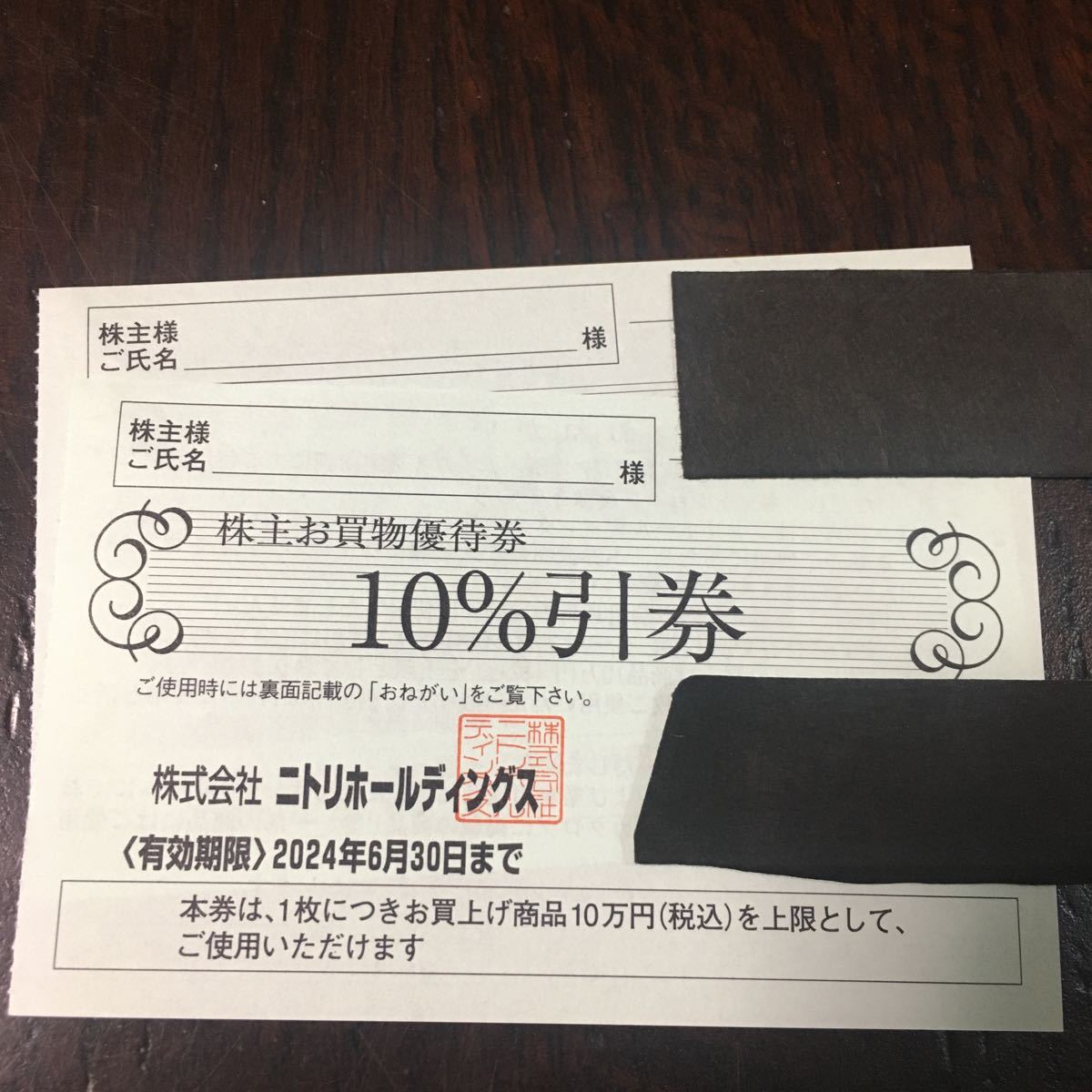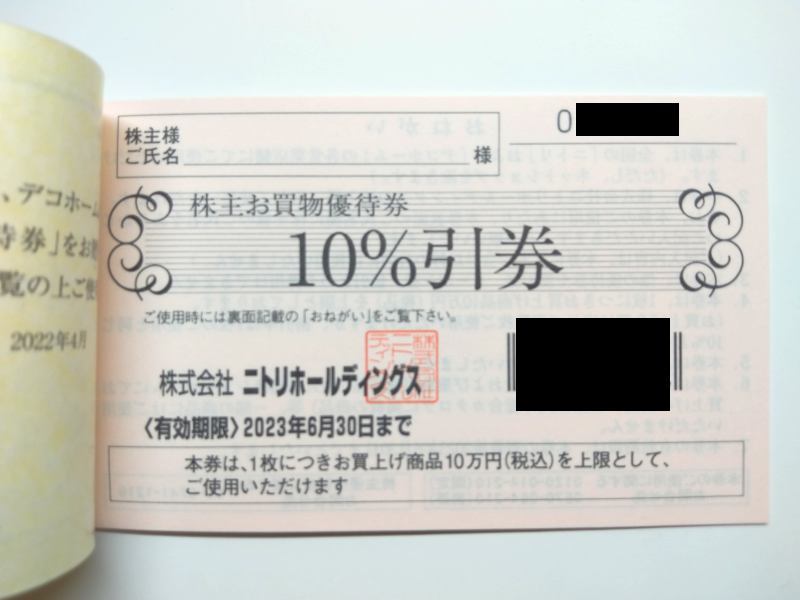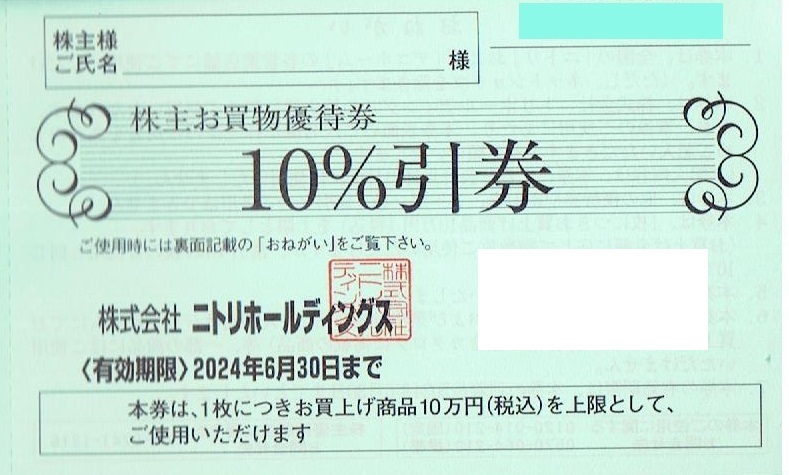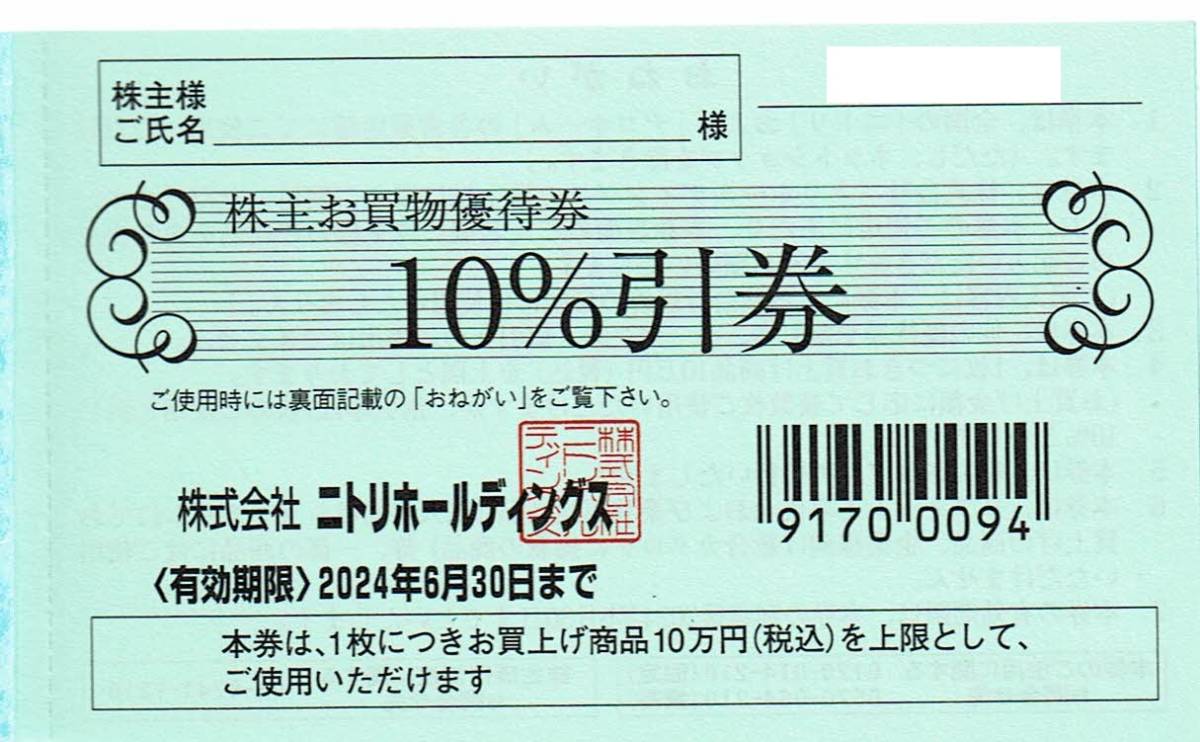ニトリ 株主お買物優待券 10枚セット
(税込) 送料込み
商品の説明
ニトリHDの株主お買物優待券(10%引券)の10枚セット価格です。
本券は、1枚につきお買上げ商品10(税込)を上限として、ご使用いただけます。
有効期限は2024年6月30日までです。
中身の確認と撮影のため封筒を開封したのみで、新品未使用品です。
なお、ばら売り、お値引きには応じかねますので、予めご了承下さい。
どうぞよろしくお願いいたします。商品の情報
| カテゴリー | チケット > 優待券/割引券 > ショッピング |
|---|---|
| 商品の状態 | 新品、未使用 |

ニトリ 株主お買物優待券 10枚セット 100%安い www.coopetarrazu.com

2023新作登場 ニトリ 株主優待券 10枚セット 有効期限:2022年5月20日

ミドリ様専用) 10枚セット ニトリ 株主お買物優待券 10%引券 【返品

最新】ニトリ株主優待株主お買物優待券10%引券2枚セットミニレター対応

lovelani.com - ニトリ株主お買物優待券☆3枚セット 価格比較

ニトリ株主優待(お買い上げ商品10万円まで10%引き券)1枚 ~24年6月

ニトリ - 2枚セット☆ニトリ 株主優待券 10万円迄 10%off 割引券

87%OFF!】 ニトリ 株主お買い物優待券 10%割引 3枚 | cenou.bf

最新 ニトリ 株主お買い物優待券 10枚 2024年6月30日まで有効 オシャレ

ニトリ株主優待券10枚セット 『3年保証』 ahq.com.mx

ニトリの株主優待券(10%割引券) (2枚セット) 有効期限は2024年6月30日

ヤフオク! - ニトリ 株主買物優待券10%引券 2枚セット □ 2023...

06-10 ニトリ 株主優待券 優待割引10%引券 10枚set-B の入札履歴

チケット ニトリ 10% 10枚の通販 by zeloshop|ニトリならラクマ

ニトリ株主優待 10%引券 3枚セットの通販 by 三河's shop|ラクマ

爆買い好評】 ニトリ - ニトリ 株主優待券 10枚 株主お買物優待券 最新

Yahoo!オークション -「ニトリ 株主優待 10枚」の落札相場・落札価格

ニトリ株主優待券(10%割引券)10枚セット×1冊 直売ファッション

最新】ニトリ株主優待株主お買物優待券10%引券2枚セットミニレター対応

ニトリ - ニトリ株主優待券10%引券 2枚セットの通販 by Berry's shop

◇06-10◇ニトリ 株主優待券 (優待割引10%引券) 10枚set-A◇ protego.md

◇ネコポス送料無料◇ニトリ 株主優待券 『10万円まで10%割引券』 15枚

即決アリ送料込み】ニトリ株主優待 ・株主お買物優待券(10%割引)の

Yahoo!オークション -「ニトリ 株主優待 10枚」の落札相場・落札価格

ニトリ - ニトリ株主優待券(10%割引券)3枚セットの通販 by Berry's

ミドリ様専用) 10枚セット ニトリ 株主お買物優待券 10%引券 【返品

爆買い好評】 ニトリ - ニトリ 株主優待券 10枚 株主お買物優待券 最新

◇大黒屋◇ ニトリ 株主お買物優待券 10%引券 4枚セット 期限2023年6

ニトリ - ニトリ株主お買物優待券 株主優待券 3枚セットの通販 by

ニトリ 株主優待 5枚セット 値段が激安 60.0%OFF sandorobotics.com

最新】ニトリ 株主優待 株主お買物優待券 10枚セット 2020年5月20日

Yahoo!オークション -「ニトリ 株主優待」の落札相場・落札価格

につき ニトリ 10%引券 5枚セットの通販 by ynkn's shop|ニトリ

2枚セット ニトリ 株主優待券 10%引券の通販 by よし's shop|ラクマ

爆買い好評】 ニトリ - ニトリ 株主優待券 10枚 株主お買物優待券 最新

◇大黒屋◇ ニトリ 株主お買物優待券 10%引券 4枚セット 期限2023年6

ヤフオク! -「ニトリ 株主優待」(優待券、割引券) の落札相場・落札価格

ニトリ株主優待(10%引券)の格安販売なら | チケットショップアイギフト

ニトリ - ニトリ株主優待券(10%割引券)3枚セットの通販 by Berry's

新品】送料無料 ニトリ お得意様お買物優待券(10%割引券)10枚セット

商品の情報
メルカリ安心への取り組み
お金は事務局に支払われ、評価後に振り込まれます
出品者
スピード発送
この出品者は平均24時間以内に発送しています














